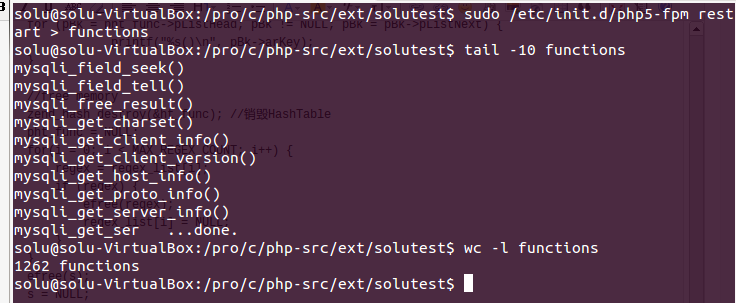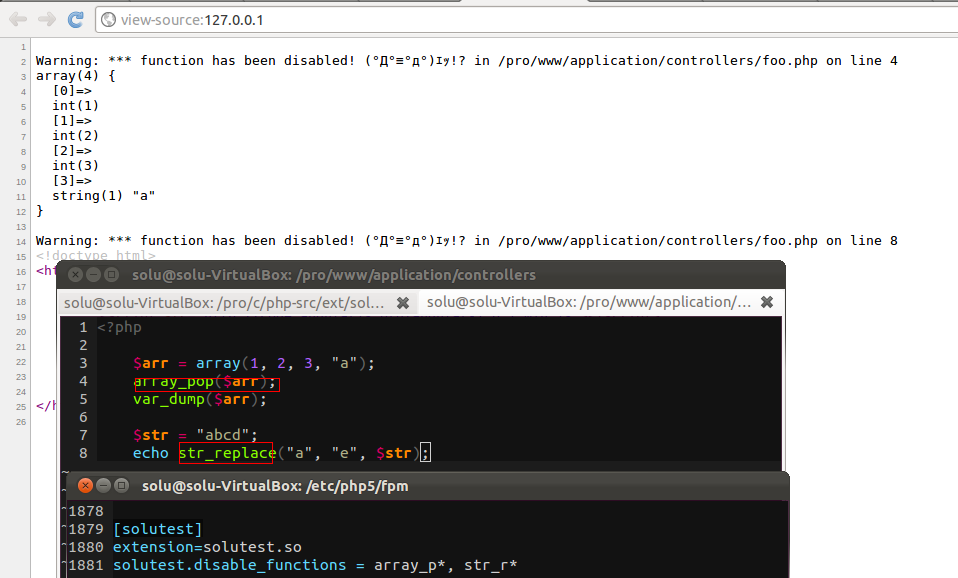![]() 本人学C语言不久,对指针内存管理等都还没入门,php扩展的编写更是胡乱在拼凑,以下是我“乱搞”的一点记录,希望大家指点和轻喷。
本人学C语言不久,对指针内存管理等都还没入门,php扩展的编写更是胡乱在拼凑,以下是我“乱搞”的一点记录,希望大家指点和轻喷。
一天翻php.ini的时候看到了一堆“同族”的函数
; This directive allows you to disable certain functions for security reasons.
; It receives a comma-delimited list of function names. This directive is
; *NOT* affected by whether Safe Mode is turned On or Off.
; http://php.net/disable-functions
disable_functions = pcntl_alarm,pcntl_fork,pcntl_waitpid,pcntl_wait,pcntl_wifexited,
pcntl_wifstopped,pcntl_wifsignaled,pcntl_wexitstatus,pcntl_wtermsig,pcntl_wstopsig,
pcntl_signal,pcntl_signal_dispatch,pcntl_get_last_error,pcntl_strerror,pcntl_sigprocmask,
pcntl_sigwaitinfo,pcntl_sigtimedwait,pcntl_exec,pcntl_getpriority,pcntl_setpriority当时就想要是支持通配符那么直接写成 pcntl_* 这样就简便多了。想法是有了,但是不知道怎么实现好。偶然的机会看到了《浅谈从PHP内核层面防范PHP WebShell》这文章,当中提到 zend_disable_function 这个函数,于是感觉先前的通配符想法可以实现了。
说一下简单的思路吧:在php.ini读取配置,遍历函数表,正则匹配函数然后删除掉,注册一个同名函数以便给前端提示。
先用C模拟一下实现吧,代码如下
#include <stdio.h>
#include <stdlib.h>
#include <string.h>
#include <pcre.h>
#define OVERCCOUNT 30
#define MAX_REGEX_COUNT 50 //最大支持规则数量
char *replace_start(char *src) { //替换通配符*号
static char buffer[4096];
char *p, *str;
char *orig = "*";
char *rep = "(\\w+)";
str = (char *)malloc(4096);
p = strstr(src, orig);
if (p == src) {
sprintf(str, "%s%s", src, "$");
} else {
sprintf(str, "%s%s%s", "^", src, "$");
}
if (!(p = strstr(str, orig))) {
return str;
}
strncpy(buffer, str, p-str); // Copy characters from 'str' start to 'orig' st$
buffer[p-str] = '\0';
sprintf(buffer+(p-str), "%s%s", rep, p+strlen(orig));
free(str);
return buffer;
}
int matchpattern(char *src, char *pattern) {
pcre *re;
const char *error;
int erroffset;
int ovector[OVERCCOUNT];
int rc;
re = pcre_compile(pattern, PCRE_CASELESS|PCRE_DOTALL, &error, &erroffset, NULL);
if (re == NULL)
return 0;
rc = pcre_exec(re, NULL, src, strlen(src), 0, 0, ovector, OVERCCOUNT);
free(re);
return rc;
}
int main(int argc, char **argv)
{
char *function_table[] = \
{"array_diff", "array_pop", "array_shift", "var_dump", "time", \
"date", "str_replace", "strstr", "test", "abc_str"};
char *ini = "array_*, *str test";
char *s, *p;
char *delim = ", ";//这里支持,号和空格来分割规则
char *regex_list[MAX_REGEX_COUNT] = {0};
int i = 0;
s = strndup(ini, strlen(ini));
p = strtok(s, delim);
if (p) {
do {
p = replace_start(p);
regex_list[i] = strndup(p, strlen(p));
i++;
} while ((p = strtok(NULL, delim)));
}
int match = -1, k;
char *func, *regex;
for (i = 0; i < 10; i++) {
func = function_table[i];
for (k = 0; k < MAX_REGEX_COUNT; k++) {
regex = regex_list[k];
if (!regex) break;
//printf("regex:%s\n", regex);
match = matchpattern(func, regex);
if (match >= 0) {
printf("function:%s() are disabled!!\n", func);
}
}
}
//free memory
for(i = 0; i < MAX_REGEX_COUNT; i++) {
regex = regex_list[i];
if (regex) {
free(regex);
regex_list[i] = NULL;
}
}
free(s);
s = NULL;
return 0;
} 
嗯,好像还不错的样子。接下来就是关键了,怎么改编成php扩展。
至于怎么快速创建一个php 扩展的就不介绍了,可以参考《快速开发一个PHP扩展》,我在这里新建了一个叫"solutest"的扩展。接着我们把上面的函数(main函数对应的改一下名字,我这里改为 static void remove_function())贴到solutest.c(文件名对应你创建时候输入的名字)里面,对应的内存操作函数可以换成由php内核提供的e*系列函数,malloc->emalloc, free->efree ...还有一点是用e*系列申请的内存才用efree来释放,要不然不会有错,囧在这里吃过亏。(详细参考《PHP扩展开发与内核应用》- 内存管理)。然后在 PHP_MINIT_FUNCTION 里面调用我们的 remove_function,为什么选择 PHP_MINIT_FUNCTION ?或者你可以尝试在 PHP_RINIT_FUNCTION 调用 (参考《PHP扩展开发与内核应用》- PHP启动与终结)。编译看看效果,别忘了需要pcre库的支持,所以要加上 pcre.h 后,然后编辑 Makefile 在EXTRA_LIBS 加上 -lpcre。
OK,make && sudo make install,接着编辑php.ini加上我们的扩展(我测试环境是nginx + php-fpm,对应php.ini在 /etc/php5/fpm/php.ini,如果不确定你加载的配置文件路径可以查看phpinfo的Loaded Configuration File)
[solutest]
extension=solutest.sosudo /etc/init.d/php5-fpm restart
我们重启fpm看看效果(如果apache环境直接重启apache服务器即可)
嘛嘛~跑起来了。
怎么获取系统的函数呢?我们可以参考一下zend_disable_function的实现
//file:"Zend/zend_API.c" line:2524
ZEND_API int zend_disable_function(char *function_name, uint function_name_length TSRMLS_DC) /* {{{ */
{
if (zend_hash_del(CG(function_table), function_name, function_name_length+1)==FAILURE) {
return FAILURE;
}
disabled_function[0].fname = function_name;
return zend_register_functions(NULL, disabled_function, CG(function_table), MODULE_PERSISTENT TSRMLS_CC);
}
/* }}} *///file:"Zend/zend_hash.h" line:154
#define zend_hash_del(ht, arKey, nKeyLength) \
zend_hash_del_key_or_index(ht, arKey, nKeyLength, 0, HASH_DEL_KEY)//file:"Zend/zend_hash.h" line:52
struct _hashtable;
typedef struct bucket {
ulong h; /* Used for numeric indexing */
uint nKeyLength;
void *pData;
void *pDataPtr;
struct bucket *pListNext;
struct bucket *pListLast;
struct bucket *pNext;
struct bucket *pLast;
const char *arKey;
} Bucket;
typedef struct _hashtable {
uint nTableSize;
uint nTableMask;
uint nNumOfElements;
ulong nNextFreeElement;
Bucket *pInternalPointer; /* Used for element traversal */
Bucket *pListHead;
Bucket *pListTail;
Bucket **arBuckets;
dtor_func_t pDestructor;
zend_bool persistent;
unsigned char nApplyCount;
zend_bool bApplyProtection;
#if ZEND_DEBUG
int inconsistent;
#endif
} HashTable;详细的解释可以参考《深入理解PHP内核》- PHP哈希表实现
好吧,依葫芦画瓢,尝试遍历一下function_table。把 remove_function 函数对应修改为
static void remove_function() {
#ifdef ZEND_SIGNALS
TSRMLS_FETCH();
#endif
char *ini = "array_*, *str test";
char *s, *p;
char *delim = ", ";//这里支持,号和空格来分割规则
char *regex_list[MAX_REGEX_COUNT] = {0};
int i = 0;
s = estrndup(ini, strlen(ini));
p = strtok(s, delim);
if (p) {
do {
//p = replace_str(p, "*", "(\\w+)");
p = replace_start(p);
regex_list[i] = estrndup(p, strlen(p));
i++;
} while ((p = strtok(NULL, delim)));
}
int match = -1, k;
char *regex;
HashTable ht_func, *pht_func;
Bucket *pBk;
//拷贝一份CG(function_table)进行操作
zend_hash_init(&ht_func, zend_hash_num_elements(CG(function_table)), NULL, NULL, 0);
zend_hash_copy(&ht_func, CG(function_table), NULL, NULL, sizeof(zval*));
pht_func = &ht_func;
for (pBk = pht_func->pListHead; pBk != NULL; pBk = pBk->pListNext) {
printf("%s()\n", pBk->arKey);
}
//free memory
zend_hash_destroy(&ht_func); //销毁HashTable
pht_func = NULL;
for(i = 0; i < MAX_REGEX_COUNT; i++) {
regex = regex_list[i];
if (regex) {
efree(regex);
regex_list[i] = NULL;
}
}
efree(s);
s = NULL;
}
应该差不多了吧,后面有...省略号是不是buffer什么的满了所以还没输出完呢???
OK,下面是重点了,删除对应的函数。其实我们抄一下zend_disable_function就OK了,有同学会问为什么不直接调用zend_disable_function,别急,下面我会说道。再次修改我们的remove_function函数,这次修改便利的循环体和 char *ini 就好
char *ini = "array_p*,"; //使用array族函数测试
for (pBk = pht_func->pListHead; pBk != NULL; pBk = pBk->pListNext) {
for (k = 0; k < MAX_REGEX_COUNT; k++) {
regex = regex_list[k];
if (!regex) break;
//regex = "^array_p(\\w+)";
match = matchpattern(pBk->arKey, regex);
if (match >= 0) {
printf("function:%s are disabled!!\n", pBk->arKey);
//zend_disable_function(func, sizeof(func));
if (zend_hash_del(CG(function_table), pBk->arKey, strlen(pBk->arKey)+1) == FAILURE) {
printf("disable %s error\n", pBk->arKey);
};
disabled_function[0].fname = pBk->arKey;
zend_register_functions(NULL, disabled_function, CG(function_table), MODULE_PERSISTENT TSRMLS_CC);
}
}
}PHP_FUNCTION(print_disabed_info)
{
//I don't know why I can't use get_active_function_name in here
// Maybe "EG"
zend_error(E_WARNING, "*** function has been disabled! (°Д°≡°д°)エッ!?"); //get_active_function_name(TSRMLS_C)
}
static zend_function_entry disabled_function[] = {
PHP_FALIAS(display_disabled_function, print_disabed_info, NULL)
PHP_FE_END
}; 估计有同学吐槽为什么用***代替了显示的函数名,这就是为什么我不调用zend_disable_function的原因。当时卡在这里很久,一直段错误,后来无意中注释了 get_active_function_name(TSRMLS_C) 就跑起来了╯-__-)╯ ╩╩,求告知。。和上面一个编译重启服务器什么的,然后看效果,因为我们配置写的是array_p*,所以一下函数被禁用了。(测试完以后记得关闭输出)
然后随便写个脚本,调用一下array_pop函数什么的,然后执行之。
It's work!! :)
呼,不知不觉写了这么长了,也懒得分两篇了。接下来把读取php.ini配置代码写上就完成了。其实这部门工作在扩展自动生成的代码已经有了,只要稍微加工一下就好。
/*
Declare any global variables you may need between the BEGIN
and END macros here:
*/
ZEND_BEGIN_MODULE_GLOBALS(solutest)
char *disable_functions;
ZEND_END_MODULE_GLOBALS(solutest)/* If you declare any globals in php_solutest.h uncomment this:*/
ZEND_DECLARE_MODULE_GLOBALS(solutest)/* {{{ PHP_INI
*/
/* Remove comments and fill if you need to have entries in php.ini*/
PHP_INI_BEGIN()
STD_PHP_INI_ENTRY("solutest.disable_functions", "", PHP_INI_ALL, OnUpdateString, disable_functions, zend_solutest_globals, solutest_globals)
PHP_INI_END()
/* }}} *//* If you have INI entries, uncomment these lines */
REGISTER_INI_ENTRIES();/* Remove comments if you have entries in php.ini */
DISPLAY_INI_ENTRIES();然后编辑你的php.ini文件,加入配置
[solutest]
extension=solutest.so
solutest.disable_functions = array_p*, 最后把我们的配置利用上,可以通过SOLUEXT_G(disable_functions)宏来访问,对应修改 remove_function 函数。去掉 char *ini 因为已经不需要了,配置从php.ini 读取,然后修改 s
最后把我们的配置利用上,可以通过SOLUEXT_G(disable_functions)宏来访问,对应修改 remove_function 函数。去掉 char *ini 因为已经不需要了,配置从php.ini 读取,然后修改 s
s = estrndup(SOLUTEST_G(disable_functions), strlen(SOLUTEST_G(disable_functions)));
:)预期的效果达到了。打完收工。
PS:
此扩展是本人YY的产物,没有经过严格测试,请勿在生产机上使用。
代码下载: http://pan.baidu.com/share/link?shareid=207778&uk=436715329
参考资料:
《浅谈从PHP内核层面防范PHP WebShell》
《PHP扩展开发及内核应用》
《鸟哥博客》
《快速开发一个PHP扩展》
《深入理解PHP内核》
来源:oschina
链接:https://my.oschina.net/u/111529/blog/107911